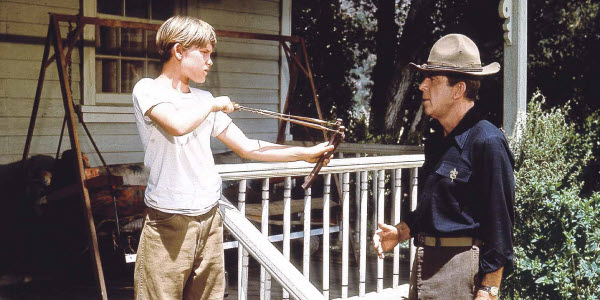I think I inherited my taste for the obscure from my mother; after all, she influenced a lot of my early movie viewing. If you asked Mom to name her favourite John Wayne movie, she might say The Angel and the Badman or possibly Donovan’s Reef. Her favourite Cary Grant movie is probably Operation Petticoat. And this is her favourite live-action Disney movie. I actually bought it for her on DVD as soon as it became available, because Mom’s not really one to seek these things out, and I knew she was unlikely to just kind of come across it.
Lem Siddons (Fred MacMurray) has been touring for he doesn’t want to think how long with a band. It’s 1930, and they no longer exactly resemble the “collegiates” the band’s name declares them. He tells Melody Murphy (Ken Murray), the band’s leader, that the first honest job someone offers him, he’ll take it and settle down. Melody points out that the local general store is hiring a stockboy. So Lem takes the job. The sight of local beauty Vida Downey (Vera Miles) doesn’t exactly hurt his choice. Lem sits in on a town meeting called to discuss what to do with the boys of the town, who are wandering around bored a lot of the time. He notices that Vida has written a note to herself suggesting the Boy Scouts, and he steals her idea and volunteers to be scoutmaster.
So we launch into Lem’s twenty-plus years as a small town grocery store employee and scoutmaster. We know that Vida isn’t going to stay with banker Ralph Hastings (Elliott Reid) once Lem sets his sights on her, of course. That they are unable to have children is a little more unexpected, but Vida declares herself comfortable with the dozens of boys that move through their lives as Lem leads the scouts.
Indeed, one of the boys in those early days is Edward White, Jr. (Kurt Russell in his first Disney movie), called Whitey of course. Whitey’s father (Sean McClory) is the town drunk. Whitey knows it and is angry. Lem manages to persuade Whitey to join the scouts. But Whitey is still touchy. His father humiliates him at the fathers’ night demonstration, then falls down dead. Lem and Vida adopt him, and he grows into a fine young man. All the scouts grow into fine young men; that’s the point, of course.
No wonder Whitey (by then Donald May) brings a wife (Luana Patten) home with him from World War II—there are no girls in town. Vida rejects 4H as a possible activity for the boys, but at least that’s something girls could do, too. I get that this is the story of a scout leader, and the Boy Scouts are just for boys. But even in the street scenes, we don’t see any little girls. There are no little sisters hanging around or older sisters being watched by the other boys or anything like that. There’s Vida, there’s eventually Nora, and there’s elderly Hetty Seibert (Lillian Gish), and that’s pretty much it for a female presence in the entire movie. It’s a little disconcerting.
Though the best sequence in the movie is the one during World War II, when the boys’ camping expedition crosses over with war games. Lem is captured by one of the sides and cannot prove that he is who he says he is because they ask him to tie a sheepshank, the one knot Lem has never been able to tie. Meanwhile, his boys take over a “destroyed” bunker and manage to “capture” a tank. Which I’ve long thought the referee allows because it’s funny to him.
This is another one of those Disney movies that kind of belies the idea that all Disney movies are sweetness and light. Whitey’s story is pretty dark. Of course he doesn’t have a mother. But he’s also something of an outcast when we first meet him. Possibly that is by choice, and possibly that is unspoken classism. Are the other boys’ parents subtly suggesting that they not play with that White boy? Still, there’s the whole “now he’s a Scout,” which only comes after Whitey breaks into the store where Lem works. Then his father, whom he loves desperately, publicly humiliates him—then drops dead, probably after drinking himself to death.
What’s more, we eventually find out that batty old Hetty Seibert is still living with the grief of having lost her sons on the same day in World War I. She’s goofy and absentminded, but she’s grieving. She loves the boys of the town because they remind her of her lost sons; a sleazy nephew is not the same.
Movies like this have a lot to do with how unsettling I found Double Indemnity the first time I saw it. I never really got into My Three Sons, but I grew up with MacMurray as Lem Siddons, not to mention Ned Brainard and Wilson Daniels. If it wasn’t him being paternal to boys, or inventing in his garage, I didn’t see it until adulthood. So sexy and murdering with Barbara Stanwyck was a little shocking. I’ve often wondered how audiences of the day thought of his going the other direction. Were people waiting for him to murder Ralph Hastings for his money?
The movie is based on the book God and My Country, by MacKinlay Kantor. As is so often the case with these, I haven’t read the book. I will note that Kantor is best known for writing about the notorious Southern prison camp Andersonville, in his book of the same name. Indeed, he won a Pulitzer Prize for it. Dissolve Couchers might be interested to know, however, that he also wrote an episode of Lux Video Theatre, the for-television version of the dramatic series sponsored by everyone’s favourite toilet soap. Nine out of ten actresses recommend MacKinlay Kantor!

